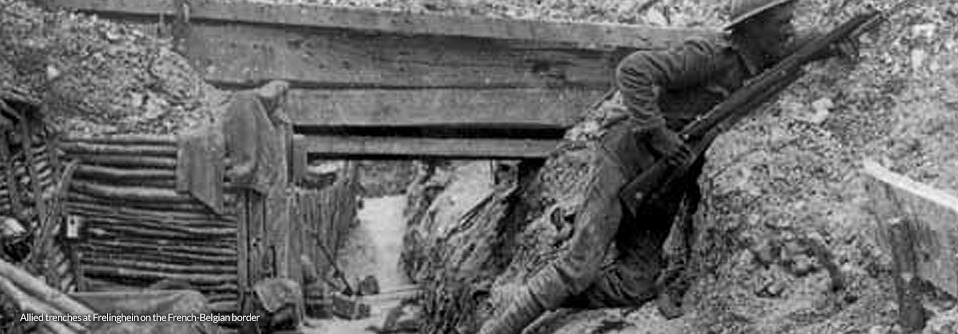The Royal Welch Fusiliers and the Great Christmas Truce, 1914

The summer crisis of 1914, which had begun on 28 June with the assassination of the Austro-Hungarian heir Franz Ferdinand, approached its climax on 2 August, the day on which the German government sent an ultimatum to Belgium demanding passage for its troops through Belgian territory in order to attack France. On 3 August, the Belgian government refused the German demands and Britain issued a guarantee of armed support to Belgium should Germany violate Belgian neutrality, in support of its position as a guarantor of Belgium’s neutrality under the Treaty of London in 1839. Germany immediately declared war on France and the British government ordered general mobilization. So we come to 4 August, the day that lies, as Barbara Tuchman put it, like an iron gate between us and the old world. That day, German troops crossed the Belgian frontier and attacked the fortress of Liège. In response, the British government sent an ultimatum to Germany demanding the withdrawal of German troops from neutral Belgium which, if it had not been accepted by 11pm London time, meant war. No such undertaking was received, and consequently Britain declared war on Germany.
or to access all content on this site, join today

For £35 a year you can access all lectures and articles on this site, attend lectures and receive our yearly Transactions
Filter by Volume
Filter by Subject
- 16th Century
- 18th century
- 19th century
- 20th century
- Abertillery
- Acts of Union
- Archaeology
- Architecture
- Arts
- Autobiography
- Bible
- bilingualism
- Biography
- Burma
- Business
- Cardiff
- chemistry
- Climate change
- constitutional
- contemporary
- Cycling
- Cymmrodorion Society
- David History
- David Jones
- Development Bank of Wales
- Devolution
- Dylan Thomas
- ecology
- Economics
- Education
- Edward Lhuyd
- eighteenth century
- Environment
- Film
- Folk Song
- Geology
- health
- Heritage
- Higher Education
- Historiography
- History
- History of Art
- History of Medicine
- History of music
- History of the Book
- history; History
- Horticulture
- Industrial History
- Intellectual History
- Iolo Morganwg
- Islam
- Jews
- John Nash
- journalism
- Language
- Law
- Law constitutional
- Legal History
- Legal Law
- Literary History
- Literature
- Liverpool
- Lloyd George
- London Welsh
- Male voice choirs
- Manuscripts
- Media
- medieva
- medieval
- Medieval History
- Medieval Literature
- medieval Poetry
- Military History
- Museums
- Music
- Myth
- Owain Glyndŵr
- Peter Warlock
- Philadelphia
- Poetry
- political
- Political History
- Politics
- prose fiction
- Railways
- Religion
- Religious History
- Science
- sixteenth century
- social
- Social History
- Sport
- Suffragette movement
- Swansea
- Tourism
- travel
- Tudors
- twentieth century
- Urban History
- Vikings
- Waldo Williams
- Wales
- war
- wellbeing
- Welsh Development
- Welsh development and investment
- Welsh Language
- welsh society
- Welsh writing in English
- Welsh; History
- Wild Wales
- women's history
- WW1
- WW2

